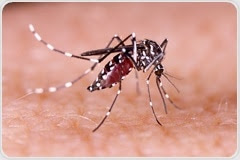| |  Researchers at the University of Delaware, working with colleagues at Indiana University, have gained new insights into the virus that causes hepatitis B -- a life-threatening and incurable infection that afflicts more than 250 million people worldwide. Researchers at the University of Delaware, working with colleagues at Indiana University, have gained new insights into the virus that causes hepatitis B -- a life-threatening and incurable infection that afflicts more than 250 million people worldwide. | |
|
| |  Thanks to advances in the development of anti-retroviral therapy (ART), patients with HIV are living longer than ever before. And yet, even in patients on very effective, long-term ART, HIV persists, requiring patients to take antiviral medication life-long. Thanks to advances in the development of anti-retroviral therapy (ART), patients with HIV are living longer than ever before. And yet, even in patients on very effective, long-term ART, HIV persists, requiring patients to take antiviral medication life-long. | |
|
| |  A new study led by the American Museum of Natural History puts forth the most comprehensive tree of life for malaria parasites to date. Known for being a devastating scourge of human health, with five species known to infect humans, there are more than 500 described species of malaria that infect mammals, birds, and reptiles. Among the researchers' findings. A new study led by the American Museum of Natural History puts forth the most comprehensive tree of life for malaria parasites to date. Known for being a devastating scourge of human health, with five species known to infect humans, there are more than 500 described species of malaria that infect mammals, birds, and reptiles. Among the researchers' findings. | |
|
| |  A first-in-human trial evaluating an experimental treatment for Ebola virus disease has begun at the National Institutes of Health (NIH) Clinical Center in Bethesda, Maryland. A first-in-human trial evaluating an experimental treatment for Ebola virus disease has begun at the National Institutes of Health (NIH) Clinical Center in Bethesda, Maryland. | |
|
| |  According to the World Health Organization, over 216 million people were infected with malaria in 2016, and 445,000 individuals died from the disease. The key to solving this health crisis is early-stage diagnosis when malaria therapeutics are most effective. A new prototype for a portable instrument capable early-stage malaria detection has been developed by a team of researchers at the USC Viterbi School of Engineering. According to the World Health Organization, over 216 million people were infected with malaria in 2016, and 445,000 individuals died from the disease. The key to solving this health crisis is early-stage diagnosis when malaria therapeutics are most effective. A new prototype for a portable instrument capable early-stage malaria detection has been developed by a team of researchers at the USC Viterbi School of Engineering. | |
|
| |  A cheap and effective tool that could save lives by helping health authorities target mosquitos infected with Zika virus has been developed by researchers from the University of Queensland and colleagues in Brazil. A cheap and effective tool that could save lives by helping health authorities target mosquitos infected with Zika virus has been developed by researchers from the University of Queensland and colleagues in Brazil. | |
|
| |  Data from the 2014 Ebola virus outbreak at two Sierra Leone facilities reveal daily usage rates for disinfectant and personal protective equipment, informing future outbreaks, according to a study published May 24, 2018 in the open-access journal PLOS ONE by Michaela Mallow of International Medical Corps in Los Angeles, CA, and colleagues. Data from the 2014 Ebola virus outbreak at two Sierra Leone facilities reveal daily usage rates for disinfectant and personal protective equipment, informing future outbreaks, according to a study published May 24, 2018 in the open-access journal PLOS ONE by Michaela Mallow of International Medical Corps in Los Angeles, CA, and colleagues. | |













































No hay comentarios:
Publicar un comentario